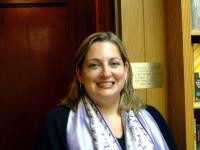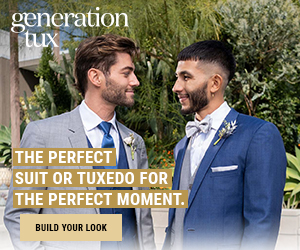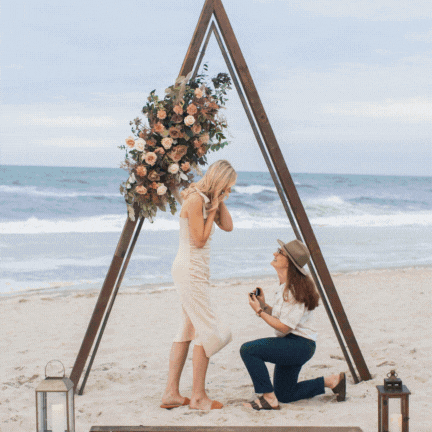This article originally appeared in Jewish Week Online
By Rabbi Marci N. Bellows, Jewish Week Online Columnist
 Among the variety of incredible lifecycle moments throughout a Jewish life, it goes without saying that a wedding is certainly one of the sweetest to experience. Surrounded by family and friends, dressed in our finest, cameras at the ready, taking part in a wedding celebration has always been considered one of the greatest mitzvot for us to perform.
Among the variety of incredible lifecycle moments throughout a Jewish life, it goes without saying that a wedding is certainly one of the sweetest to experience. Surrounded by family and friends, dressed in our finest, cameras at the ready, taking part in a wedding celebration has always been considered one of the greatest mitzvot for us to perform.
This past weekend, I experienced one of the most profound moments in my rabbinate thus far. For the first time, I was lucky enough to officiate at a legal wedding ceremony between two wonderful men. Though I had been a part of commitment ceremonies for gay and lesbian couples in the past, this would be the first time that I had the privilege of signing a civil marriage license, as well as a ketubah, for the happy couple.
Gary Schoenbach and Matthew Tighe had met ten years ago on a college field trip. They shared with me that they had immediately felt a “spark,” and their love had deepened and grown ever since. A little over three years ago, they moved in together, and did as much as they could to create a sense of permanence in their relationship. They had considered going up to Massachusetts to get married, but acknowledged that it wouldn’t be the same as getting married here in their home state of New York.
Then, miracles of miracles, same-sex marriage was deemed legal in New York State on June 24, 2011. That very night, Gary and Matthew decided to get married. They contacted me soon after, and we began planning for the special occasion. We decided to hold an aufruf (wedding blessing) at my congregation on the Shabbat before their wedding, which would enable them to be called to Torah for an aliyah, and thus celebrate their upcoming nuptials publically. We also put much care into a wedding ceremony which would be meaningful to them as Jews, as gay men, and as two people deeply in love.
In many ways, the planning was surprisingly typical – they selected a ketubah, invited family members to participate in various ways in the ceremony, and decided how the chuppah would be decorated. And then there were the beautifully different parts of the ceremony. We included a special reading, taken from a document created by the Central Conference of American Rabbis (CCAR) Working Group of Same-Gender Officiation, which added an additional meaning to the breaking of the glass:
Because so many gays and lesbians sadly still know the oppression and pain of hiding, because so many gays and lesbians still lack equality of civil rights in our world, we break glasses on this day of celebration to remind us that even in this hour of great joy, our world is still incomplete and need of healing. May the time be soon, speedily and in our day, when all who are in hiding shall be free and all who are in exile shall come home.
In 2000, the CCAR passed a resolution supporting the decision of Reform Rabbis to officiate at same-sex weddings, and, in 2004, the Northeast Region of the CCAR passed a resolution supporting equal marriage rights for same-sex couples. Since then, the organization has worked to provide materials, liturgy, essays, and more for Reform Rabbis who wish to officiate at these ceremonies. I am grateful to be a part of an organization and movement which supports equal rights so fully.
I cannot possibly express how important it is to me to “normalize” the experience of same sex marriages, in that they should be just as special, just as legal, and just as familiar to us. I would hope that seeing an aufruf during a Shabbat service will feel just as celebratory to the congregation, whether it is for a heterosexual couple or homosexual couple. I would hope that our congregations would warmly welcome all families into their communities, no matter the gender of the adults. I would hope that all youth in our synagogues would feel comfortable being themselves, whether they find themselves gay, straight, lesbian, transgendered, bisexual, or questioning. I would hope that, because my congregants see that we are open and accepting of all sexual orientations, instead of succumbing to bullying, or taking one’s life because of feeling bad about oneself, a person in pain would come to me for help and comfort.
Jay Michaelson, in his new book, God vs. Gay? The Religious Case for Equality, writes: “If God loves us, then God could never want the closet. If there exists a loving God, I know in my heart that this God could not wish for human beings to lie, to repress their emotional selves, and to distort that aspect of the soul which leads to the highest of human satisfactions into a dark force of evil and objectification. It is inconceivable to me; the contradiction is too great.”
May we all remember that, according to Genesis, “It is not good for man to be alone,” and that we are all human beings created in the image of a loving God. I pray that Gary and Matthew, and all other couples who wish to marry thanks to New York State’s new law, are blessed with lives of love, good health, good friends, success, and joy.





















